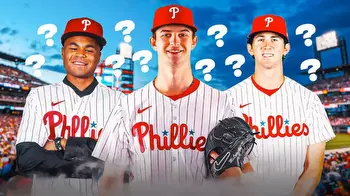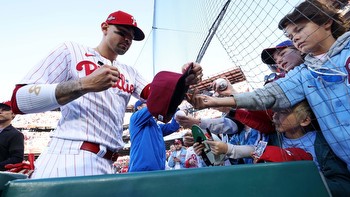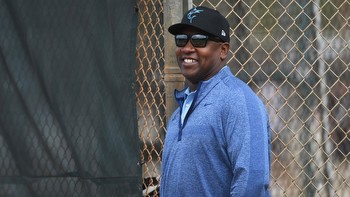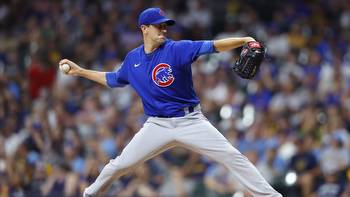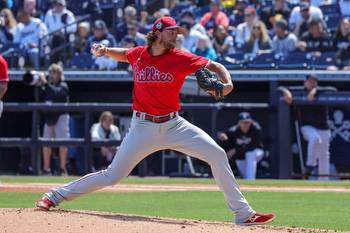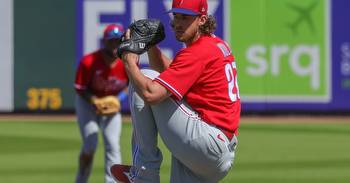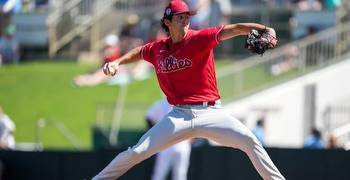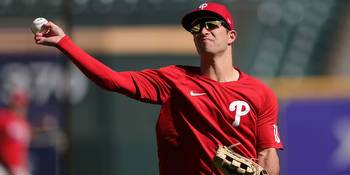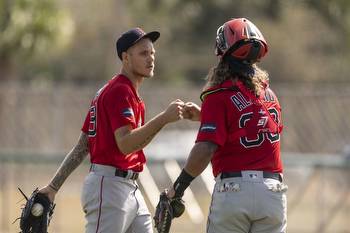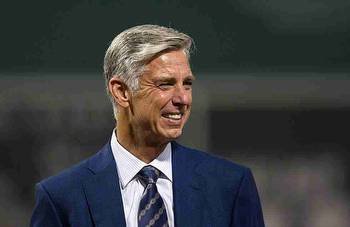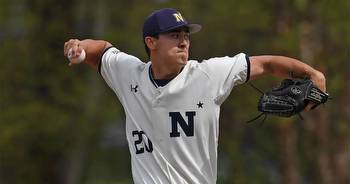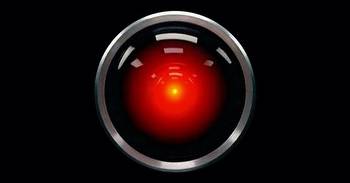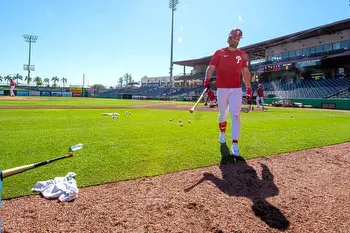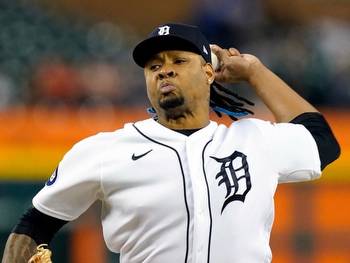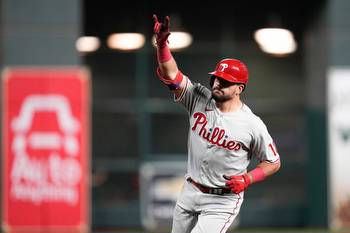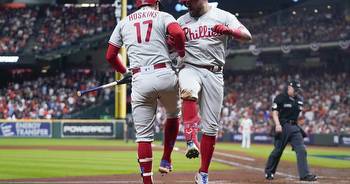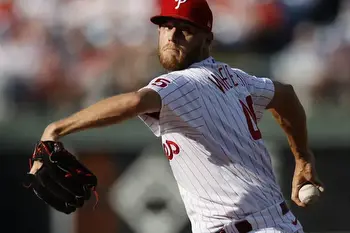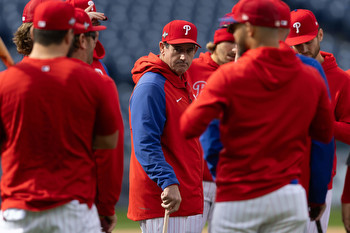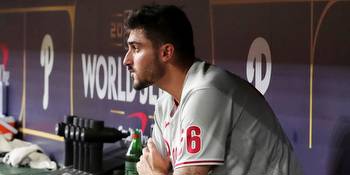Why are the Phillies pushing 19-year-old Andrew Painter? Trust
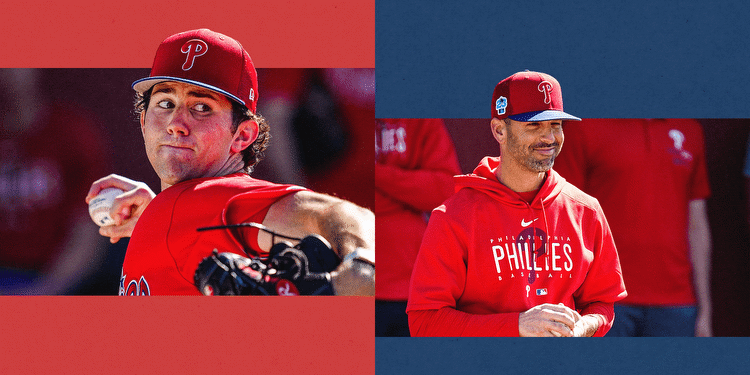
CLEARWATER, Fla. — As Andrew Painter commanded all of the attention during a routine bullpen session on the first official day of Phillies camp, the 19-year-old righty knew he could turn to someone familiar if needed. Brian Kaplan was there when Painter, a little clumsier and a little rounder, walked into his gym five years ago. Painter was 14. It was 55 minutes from home to Cressey Sports Performance. Peter Painter, a chiropractor who had heard about Eric Cressey’s methods, wanted the best for his son. So, he drove Andrew back and forth twice a week until the boy secured his driver’s license.
Kaplan co-founded the Cressey gym, which has morphed into a popular destination for big-name baseball players, in Florida. He scripted most of Painter’s throwing program through high school — when to push things, when to rest. He taught Painter about his body, and how to best use the genetic advantages he had been granted as a strong, 6-foot-7 pitcher who could control his movements. He became a confidant and a compass.
Now the Phillies director of pitching development, Kaplan stood beside Painter as he threw his bullpen at the Carpenter Complex. This improbable quest for a teenager to win a big-league rotation spot lurched forward.
“He was always looking out for me when I was young,” Painter said, “trying to do what was best for me.”
To understand why the Phillies are willing to thrust this young prospect into such uncommon territory, you must begin here. The Phillies had layers of intel that led them to select Painter with the No. 13 pick in the 2021 MLB amateur draft. They extensively scouted him. They had a scouting director, Brian Barber, with pertinent perspective as a former high school phenom in Florida once taken in the first round. They had input from their former manager, Joe Girardi, whose son played with Painter.
They had Kaplan.
He had taken a consulting job with the Phillies in 2019 that entailed doing special assessments of specific amateur targets or sessions with Phillies farmhands.The team liked his work. In the spring of Painter’s draft year, the front office asked Kaplan for an evaluation. It was not going to be the deciding factor. Just another element. They knew there would be some bias. Kaplan wasn’t blind to it.
Painter was throwing 94 to 96 mph and touching 97 mph as a senior in high school. It was elite-type stuff for a pitcher his age. He checked all of the boxes, but pitchers like Painter are considered huge risks or, at the very least, massive projects.
“Believe it or not,” Kaplan told the Phillies, “there’s more in the tank.”
Now, the two smile about it. Everything has happened too fast. Painter began the 2022 season at Low-A Clearwater and ended it at Double-A Reading while posting a 1.56 ERA and striking out 39 percent of the batters he faced. It’s weird, Kaplan said, to both be here in this moment when everyone is trying to pretend this is totally normal. Only four teenagers have thrown a pitch in the major leagues since 1992. “He’s just another kid in big-league camp,” Kaplan said. “What are you talking about?” He smirked.
This is either haphazard or brilliant, but the Phillies are convinced their plan for Painter is the latter because they’ve put an incredible amount of thought into it. It’s audacious to ask a teenager who threw 103 2/3 innings in his first full professional season to compete for a big-league rotation job. The Phillies have mapped out various scenarios to make it work. It requires everyone to have a little faith in the unknown.
“Where our relationship is most impactful for the organization is the trust factor,” Kaplan, 39, said. “Because our relationship is what it is, he trusts the decisions we’re making. And our decisions are not made lightly. Our decisions have been discussed across the entire organization — all the way down to the coaches who were with him from when he first started (in the minor leagues). Strength coaches. Trainers. Mental performance team. Everybody. Everybody’s been in on this.
“He trusts us. He doesn’t have his guard up. He’s not questioning things when he turns his back.”
Kaplan was there five years ago. He was there last Thursday as a resource for Painter and every other pitcher in camp because the Phillies have a deep-rooted confidence in what he preaches. Kaplan and pitching coach Caleb Cotham have created an organizational strength with how the Phillies refine pitchers that was years in the making — and no one could have known it.
“It all comes together,” Kaplan said. “Everything has its place. The wheels definitely got started a long time ago. But Andy just kind of came into my world and I got lucky.”
Sam Fuld spent most of the 2010 season playing at Triple-A Iowa, and he decided he needed a change the winter after. He relocated to Jupiter, Fla. Somewhere warm. He began his offseason training at a Gold’s Gym. But he needed space to run sprints.
One day, he spotted a field at a nearby private school. “Beautiful grass,” said Fuld, who is now the Phillies general manager. Fuld started to run at The Benjamin School. Soon, someone who looked like he was in charge, walked over. He told Fuld about this small gym he had started. He had once been a pitcher, highly recruited to Notre Dame, only to suffer a career-ending injury that caused numbness in his right hand. He had since dedicated his work to helping other athletes achieve what he could not.
“In some ways, his injury was a blessing in disguise,” Fuld said. “It tapped into a better understanding of how the body works.”
Fuld went to the gym. “Size of a shoebox,” he said. It was called Athletic Development Performance, an uninspired choice of buzzwords. But the man had ideas Fuld had never heard before. He had a reassuring presence. He even tried to teach Fuld how to surf, and it ended with a small gash on Fuld’s forehead.
“But,” Fuld said, “it wasn’t his fault.”
Brian Kaplan had come into Fuld’s world and, a dozen years later, they would celebrate a National League championship together.
Painter fully committed to Kaplan and the Cressey staff in 2020 after his junior year. He quit basketball at Calvary Christian High and spent six days a week at Cressey. “That was kind of just home for me,” Painter said. The two prepared for an important senior season, beginning with the very first start.
“If you pitch in February in Florida, the whole country is there to watch because nobody else is playing,” Kaplan said. “So he knew what was on the line.”
Painter struggled in that first start. “Struggling, I say that in Andy Painter terms,” Kaplan said. Painter allowed five runs. “It was bad,” Painter said. He drove to Cressey to see Kaplan the next day.
“You can think about it for a day,” Painter said. “I give myself a day. But the next day, you wake up, you can’t let it affect your work. You need to wake up hungrier, almost use that as motivation.”
Kaplan saw a 17-year-old kid who had what he described as a “unique mentality” after that moment.
“It got him stronger,” Kaplan said. “It got him more committed to that year. It got him a little bit tougher. Whether or not I knew he was going to have the potential to be in the big leagues two years later … no. But I knew. That’s a kid that is going to understand the ups and downs of pro ball. He’s going to be able to manage that.”
There is more to it than that. The Phillies are not willing to push Painter just because he is physical, throws hard and has a steady mind. Kaplan studies how the human body works, how a pitcher can repeat the unnatural strain of throwing a baseball that hard over and over again. It is impossible to prevent every ailment. But there are ways to arm a pitcher with better odds.
Kaplan told the Phillies there was more for Painter to unlock because he knew his offseasons had been geared toward basketball before his senior season. “Which I was all in favor of,” Kaplan said. “He did not need to pour everything into baseball that early.” Painter was not engineered in a lab, but he had been exposed to efficient training before his body matured.
“We were doing movements specifically for my body,” Painter said. “What was going to be good for me. That, combined with growing up and hitting puberty and growing into the body, we were already doing those steps to gain a feel for it.”
He had established favorable habits well beyond his age.
“Typically, you don’t see that type of body control with that kind of size,” Kaplan said. “He’s been able to learn how to control his levers and his size from an early age. And being in the right type of program and the right type of environment — learning why it is you need to move the way you do.”
When Fuld became GM in 2021, he knew he wanted to recreate what Kaplan had shown him was possible. There is hitting and pitching instruction but those methods are not independent of how someone’s body moves. A hitter might not reach a certain zone or a pitcher might not be able to locate a certain pitch because their body’s movement prevents them. The training had to be integrated.
Kaplan was a pitching guy, but after their chance meeting on that beautiful grass and continuous work after, Fuld was convinced.
“It allowed me to learn about myself physically,” said Fuld, who played in the majors for eight years. “He laid out a roadmap of how to connect the dots between how I moved as an athlete and what that meant for me as a runner, an outfielder and a hitter.”
The Phillies hired Kaplan full-time a few months after drafting Painter in 2021. Kaplan had been offered jobs by teams before but rejected them. He accepted this one because of Fuld. “It’s a trust and respect we have for each other,” Kaplan said. He cashed out his equity at Cressey. Kaplan, in addition to running the minor-league pitching program, is an assistant pitching coach in the majors with the Phillies.
Here’s 6 minutes of AA highlights from Andrew Painter (future Phillies ace). pic.twitter.com/ggSG2foSdz
— John Foley (@2008Philz) January 13, 2023
Painter is gifted in ways that cannot be coached. Kaplan stressed this. The work they did was important in creating good habits. “But it’s more of how he’s put together,” Kaplan said. “Yeah, everything is a piece. That was a piece that definitely assisted him and helped move him forward. But he’s a unique specimen, and a lot of that is just him being him.” The Phillies are confident in letting Painter be Painter because Kaplan can attest to the diligence the teenager possesses.
Because Painter has extraordinary control of his body, he can command a high-velocity fastball at the top of the strike zone like few others at this age. That, specifically, is where the comparisons to Justin Verlander, who debuted at 22 for Dave Dombrowski’s Detroit Tigers, are warranted. But Painter cannot plow through a big-league lineup with only his fastball. Painter’s slider and curveball need refinement. He doesn’t show his changeup much. The Phillies gave him a cutter to tinker with this spring as another potential weapon against right-handed hitters. He has the aptitude, Kaplan said, to better incorporate his secondary pitches.
Painter, who turns 20 on April 10, is both polished for his age and unfinished as a potential big-league starter.
“I trust everything they do,” Painter said. “They’re looking out for me. They’re going to do what’s right for me and my career. I’ll put it in their hands, and I am completely fine with that.”
He doesn’t have to look far to remember why that trust is steadfast.
(Top image: John Bradford / The Athletic;

